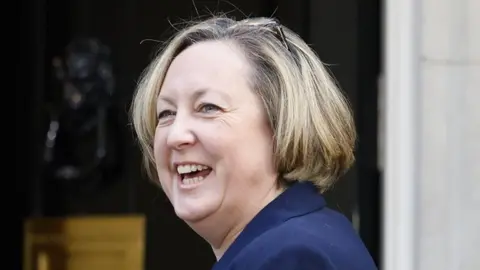Rishi Sunak demotes Truss allies as reshuffle continues
 EPA
EPARishi Sunak has demoted three allies of his predecessor Liz Truss as he carries on assembling his ministerial team.
Anne-Marie Trevelyan has been moved from transport secretary to be a minister in the Foreign Office.
Edward Argar, who was chief secretary to the Treasury, becomes a justice minister. Chris Philp, who was paymaster general, is now a Home Office minister.
On Tuesday, Mr Sunak removed some key allies of Ms Truss from the cabinet.
But there was also a focus on unity - with some figures from her top team, such as Foreign Secretary James Cleverly, keeping their roles.
Ms Trevelyan, Mr Argar and Mr Philp all attended cabinet under Ms Truss, but will no longer do so in their more junior roles.
Mr Philp was previously switched from chief secretary to the Treasury to Cabinet Office minister and paymaster general after the turmoil following the government's tax-cutting mini-budget.
All three backed Ms Truss in the summer Tory leadership contest, after their first-choice candidates dropped out of the race.
Elsewhere, Financial Secretary to the Treasury Andrew Griffith - another Truss supporter in the summer - has been demoted to economic secretary, a more junior role in the department.
He will be replaced by Victoria Atkins, a former justice minister and one of scores of Tory MPs who quit Boris Johnson's government in July.
Damian Hinds - a former education secretary - becomes a minister in the justice department.
Other appointments include:
- Nick Gibb and Robert Halfon as education ministers
- Jesse Norman and Huw Merriman as a transport ministers
- Alex Chalk as a defence minister
- Lucy Frazer as a minister in the Department for Levelling Up, Housing and Communities
- Helen Whately as a minister in the Department for Health and Social Care
- George Freeman as a minister in the Department for Business, Energy and Industrial Strategy
- Marcus Jones as a government whip
Most supported Mr Sunak in both Tory leadership contests this year.
Among those reappointed to the same role under Mr Sunak were James Heappey as defence minister. Under Ms Truss, Mr Heappey had said he would resign if the government broke a pledge to spend 3% of GDP on defence by 2030 - a pledge Mr Sunak has not committed himself to.
Graham Stuart was also reappointed as climate minister but will no longer attend cabinet.
Others reappointed include Greg Hands as trade minister and Steve Baker as Northern Ireland minister.
World leader calls
As well as making ministerial appointments, Mr Sunak has been holding calls with world leaders during his first few days in office, including US President Joe Biden and Ukrainian President Volodymyr Zelensky.
No 10 said he had also spoken to the prime ministers of India, Ireland and Australia, as well as EU Commission President Ursula von der Leyen.
On Tuesday, No 10 said it wanted to show "unity, experience and continuity" in key cabinet roles.
Jeremy Hunt, who is due to deliver a statement on the government's plans for tax and spending on 17 November, was kept on as chancellor. Meanwhile, Defence Secretary Ben Wallace, who has played a key role in the UK's response to the war in Ukraine, also remained in post.
Experienced ministers who served under Boris Johnson, such as Michael Gove, were brought back.
Labour has criticised the return of Suella Braverman, who was reappointed as home secretary just days after she resigned after admitting she had breached government rules by sending an official document from her personal email.
Former Conservative chairman Jake Berry also questioned the appointment, telling Talk TV the breaches had been multiple and serious.
Senior minister Nadhim Zahawi defended Ms Braverman's return to the cabinet, telling the BBC he believed in "redemption" and the prime minister had decided to give her a second chance.
The BBC has been told the home secretary has requested further briefings on email security.
